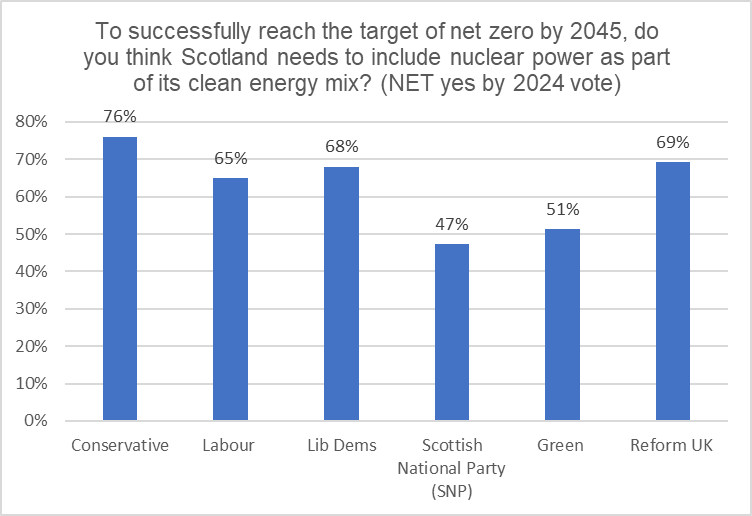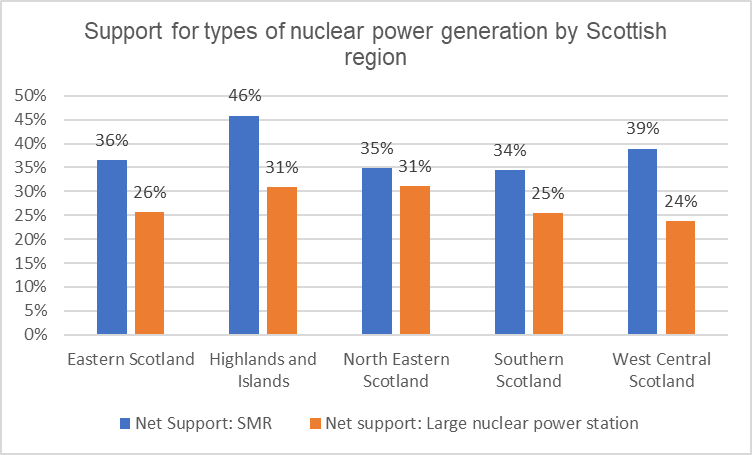What do the Scottish public think about the ban on new nuclear power?
A deeper look at some Britain Remade polling
Britain Remade, the campaign group I work for, exists to identify and break down some of the many barriers to building infrastructure and homes that exist across Britain.
One such barrier is the Scottish Government’s opposition to new nuclear power. Since the election of the first SNP Government in 2007, the Scottish Government has been opposed to the construction of new nuclear power in Scotland. While energy policy is reserved to Westminster, the Scottish Government’s control over planning policy means this opposition amounts to an effective ban on new nuclear power in Scotland.
This means that when Torness power station, just outside Dunbar in East Lothian, shuts down in the next decade, Scotland will lose its last remaining nuclear facility- ending six decades of nuclear power generation in Scotland. This is in spite of Torness being Scotland’s most productive low-carbon asset, generating enough clean electricity since 1988 to power every home in Scotland for 36 years, and Scotland having a net zero target of 2045, 5 years more ambitious than the UK’s.
As my colleague Sam Dumitriu has argued, turning away from nuclear in this way is an extraordinarily short-sighted policy. As an organisation we’ve been campaigning for the Scottish Government to lift its ban.
But what do the Scottish public actually think about new nuclear power and the Scottish Government’s effective ban?
To delve deeper into this problem, we worked with Opinium, undertaking an online survey of 1,000 Scottish adults between 22nd - 25th April 2025. The figures, which for transparency you can find in full here, have been weighted to be politically and nationally representative of all Scottish adults (aged 18+).
Firstly, we polled Scots on their views on the Scottish Government’s net zero target, asking them if they supported or opposed the Scottish government’s commitment to reaching net zero by 2045.
As you can see from the above, there’s significant support for the Scottish Government’s target, with 53% of all Scots supportive; 18% opposed; and 29% not expressing an opinion.
However, the headline figures belie a spread in views between supporters of different parties. While 72% of SNP and 57% of Labour 2024 General Election voters back the target, only 20% of 2024 Reform voters and 32% of 2024 Conservative voters do.1
But what of nuclear? Firstly we asked respondents “which of the following statements comes closest to your view of Scotland’s clean energy mix”.2
As you can see, 51% of Scots believe that new nuclear power should be part of Scotland’s clean energy mix, with only 27% actively opposed. When we break this down by vote in last year’s general election, we again find a significant spread by party:
What is most interesting about the above is that the only voters in 2024 with net opposition to this statement were SNP voters (40% in favour vs 46% opposed).
However, if we look further back to those that voted SNP in the 2021 Holyrood election, we find a net approval for including new nuclear power sources into Scotland’s clean energy mix (43% in favour vs 40% opposed). This suggests that the voters the SNP lost to other parties in 2024- an election in which they suffered a net loss of 39 seats- were more supportive of new nuclear power than the smaller core of voters who remained loyal to the party.
This is something for the SNP to bear in mind ahead of the Holyrood elections next May, as it appears that the marginal Scottish voter is more pro-nuclear than their base.
To further test this, we also asked respondents whether they thought Scotland needs to include nuclear power as part of its clean energy mix to successfully reach its target of net zero by 2045.
Here we see stronger support for nuclear, with 56% in support and 23% opposed:
Again, views on this range between support for different parties in the 2024 election:
The only voters without majority support for nuclear to help reach the net zero target were 2024 SNP voters, though it is worth noting that net support was 47% and net opposition was 39%.
However, when we look back at voters views by their vote in 2021, we see that a majority of SNP voters at that election support the use of nuclear to reach net zero by 2045:
Again, this suggests that the voters that the SNP lost between 2021 and 2024 were markedly more pro-nuclear than the voters that remained with them in 2024.
We also explicitly asked for respondents' views on the Scottish Government’s effective ban on new nuclear power. The question we asked was:
It has been a long-standing Scottish government and SNP policy to oppose the construction of new sources of nuclear power in Scotland. This constitutes an effective ban on the technology because planning proposals are highly unlikely to be approved while this policy remains in place. Would you say you support or oppose this effective ban on new nuclear power in Scotland?
As you can be expected from a question which can be read as much more party political, this saw slightly different results, largely driven by 2024 SNP voters support for SNP policy (48% support vs 29% opposed):
Again however, we see a repeat of the pattern we see in previous questions where voters that voted SNP in 2021 were more supportive of nuclear than 2024 SNP voters, with 43% supporting the ban and 30% opposing it.
Finally, we asked respondents their views on whether they would oppose or support a large nuclear power station or a small modular reactor (SMR) near where they live:
Understandably, attitudes harden a fair bit when it comes to asking people a question that directly affects them. We also have to remember that for many respondents, particularly those living in major urban centres like Glasgow or Edinburgh, it just would not be appropriate to build a large scale nuclear power station “where they live”.
This is borne out in our data, which finds that those who live in less densely populated areas such as the Highlands and Islands are more likely to support new nuclear being built near where they live:
That said, as I have written previously, our experience over the years has shown that the people most supportive of nuclear power are those that live closest to it. It therefore came as no surprise that in May we were able to fill a room in Dunbar in support of new nuclear power at Torness.
So what can we take from these findings?
Obviously individual polls are just snapshots of public opinion, but it seems that the Scottish public is much more up for new nuclear than current Scottish Government policy allows for.
This is particularly true for those voters that the SNP lost between 2021 and 2024, primarily to Labour.
There’s a strong policy case for the Scottish Government to follow Denmark’s lead and drop their opposition to new nuclear power generation. This polling suggests there may also be an electoral case for doing so.
While I refer to subsamples a fair bit in this piece, it’s worth treating them with a bit of caution. Of our sample of 1000 voters, 242 voted Labour in 2024 and 206 voted SNP; but only 26 voted Green and 48 voted Reform. Again the full data for the polling can be found here
The polling included a note stating that “By “clean energy mix” we mean the combination of future clean energy sources Scotland uses to generate electricity”.










